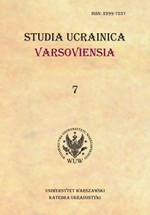Świat po katastrofie. Motywy postczarnobylskie w powieści Очамимря Ołeksandra Irwańca i w dramacie Na początku i na końcu czasów Pawła Arje
The world after the catastrophe. The post-Chernobyl themes in the novel Ochamimriya by Oleksandr Iwaniec and the drama At the beginning and end of the times by Pawel Arje
Author(s): Paulina Olechowska, Marta ZambrzyckaSubject(s): History, Language and Literature Studies, Studies of Literature, Culture and social structure , Theory of Literature
Published by: Wydawnictwa Uniwersytetu Warszawskiego
Keywords: Chernobyl; catastrophe; apocalypse; sickness; isolation
Summary/Abstract: The subject of the article is the analysis of post-Chernobyl themes in the novel byOleksandr Irwaniec Ochamimriya and in Pawel Arje’s play At the beginning and end oftime. The Chernobyl disaster played a key role in the development of contemporary Ukrainianliterature and culture. Chernobyl very quickly became a universal metaphor that havegone far beyond ecology and into a cultural and political context.In both works, the atomic explosion (taken literally by Arje, as the explosion of theNo. IV reactor in Chernobyl and by Irvacek more vaguely as an explosion) is a key elementof the plot, aff ecting both the fate of the characters and the shape of the surrounding reality.Although these works belong to two diff erent literary genres and showcase two diff erentconventions of presenting reality, they are connected by a post-apocalyptic visionof the world and the concept of a looping time. The heroes of both texts live in a timeafter the catastrophe, deprived of civilized goods and isolated from the rest of the world.In the novel by Irwaniec, this time after the catastrophe is a sort of “new medieval” witha decidedly pessimistic expression while in Arje’s drama the return to the pre-industrialworldview contains hope for fi nding traditional values. Both texts also address issuesrelevant to the modern post-Soviet society, but they do so in very diff erent ways. Irwanećuses grotesque, to deprive his characters of complexity, while Arje makes his charactersdeeply tragic and psychologically probable.
Journal: Studia Ucrainica Varsoviensia
- Issue Year: 2019
- Issue No: 7
- Page Range: 121-136
- Page Count: 16
- Language: Polish

